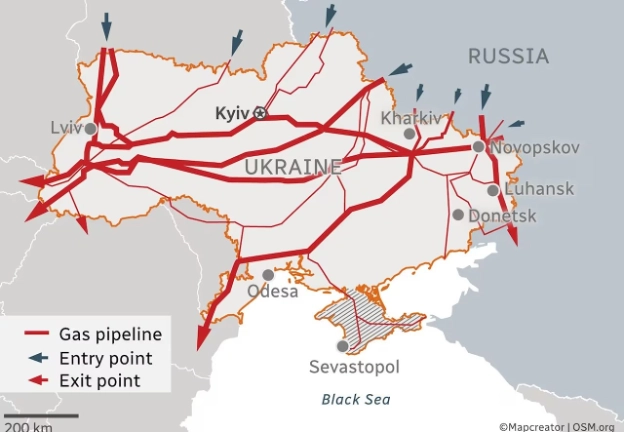- Kyiv’s drones continue to hit Russian oil refineries amid Moscow’s oil export ban
- Athens provides security assistance package to Kyiv after Greek Prime Minister’s visit to Odesa
More than a dozen Russian oil refineries and a liquid natural gas (LNG) terminal have been struck by suspected Ukrainian drones since the beginning of the year, leading to a Kremlin decision to suspend oil exports for six months as of the beginning of March.
Over the past decade, oil and gas exports have accounted for about 30-50 percent of Russia’s state revenues, according to Oxford Energy in Britain.
JOIN US ON TELEGRAM
Follow our coverage of the war on the @Kyivpost_official.
Moscow’s policy decision was presumably made to keep domestic gasoline prices low at petrol stations, Reuters and Bloomberg news agencies reported.
Six Russian oil refineries alone have been struck in the past week, the latest being the Slavyansk-na-Kubani plant in Russia’s Krasnodar region on March 17, local Russian officials said. Russian military bloggers also shared videos on the Telegram social media platform that offered visual evidence of the damage to those who know how to conduct geolocation.
The damage to Russia’s main source of hard currency earnings comes amid growing criticism that Western, Australian and Japanese sanctions put in place as a result of Russia's unprovoked war on Ukraine aren’t having the desired effect.
The strikes on Russian oil refineries “have exposed Russia’s vulnerabilities,” Ukrainian President Volodymyr Zelensky said in his nightly address to the nation on March 17. About half of Russia’s 30 largest oil refineries have thus far been struck, Kyiv-based Dragon Capital said in a note to investors seen by the Kyiv Post.

Zelensky Meets CIA Director William Burns in Ukraine
“The extent of damage caused by these strikes is not fully clear, but drones reportedly hit valuable refining units at four plants, including the Rosneft and Lukoil refineries together accounting for around 12 percent of Russia’s total refining capacity and forcing the latter two to at least halve production, according to Reuters, and spend months on repairs,” Dragon Capital said.
Ukrainian open-source intelligence sources also shared videos on March 18 showing at least one drone strike on the Energomash liquid propellant rocket plant in the Belgorod region.
Kyiv also announced it will not renew a contract with Russian state-owned Gazprom to transport natural gas through pipelines on its territory, Ukrainian Energy Minister Herman Halushchenko told local media.
He said that “the network of gas pipelines passed the stress test and is now ready for life without the transit of Russian gas."
A map of Ukraine’s pipeline network. Credit: Public domain information.
Zelensky promised a “reciprocate” response to Russia’s airborne attacks on Odesa after meeting with Greek Prime Minister Kryiakos MiItsotakis on March 6.
Both were at the Black Sea port city, one of Ukraine’s five most populous cities, when Russian projectiles landed “300-400 meters” away, Ukraine’s second war-time president said.
In response and upon his return to Athens, MiItsotakis announced a security assistance package to Kyiv on March 17.
It includes 2,000 five-inch Zuni rockets, 180 2.75-inch anti-tank rockets, 90,000 anti-tank and anti-aircraft ammunition, 4 million bullets and 70 US-made M114A1 howitzers, according to Greek newspaper Kathimerini.
Earlier this month, MiItsotakis visited Odesa to speak with Zelensky when a Russian aerial bombardment took place.
“It was an impressive experience, we understand that this war affects everyone and spares no one,” the Greek Minister said afterward upon returning to his homeland.
You can also highlight the text and press Ctrl + Enter







